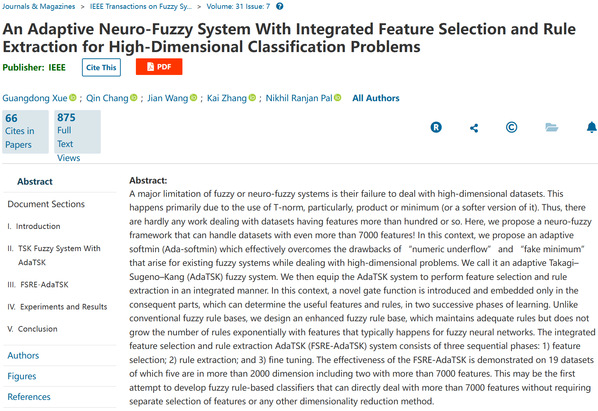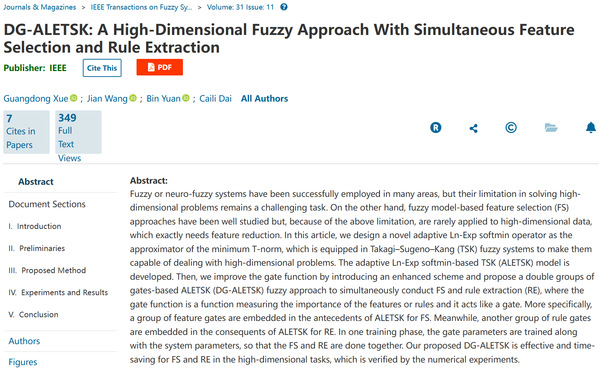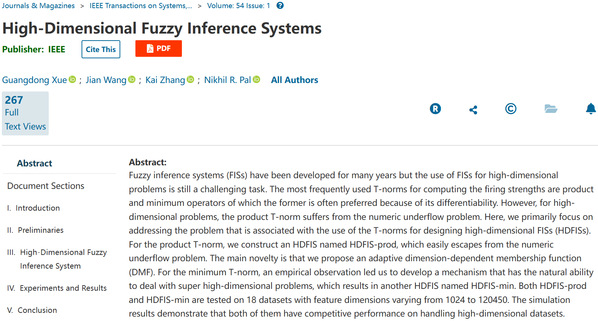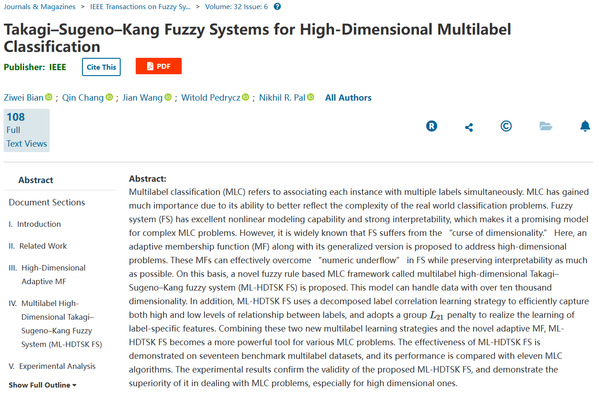Recently, the team has made a series of advances in fuzzy systems for processing high-dimensional data, and the related results have been published in the top academic journals in the field of fuzzy systems, such as IEEE Transactions on Fuzzy Systems and IEEE Transactions on Systems, Man, and Cybernetics: Systems and other top academic journals in the field of fuzzy systems. The results have been supported by the National Natural Science Foundation of China, the National Key Research and Development Program, the Major Science and Technology Projects of China National Petroleum Corporation (CNPC), the Fundamental Research Funds of the Central Universities, the China-Central and Eastern European Association of Colleges and Universities Program, the Program for the Introduction of High-level Talents from Foreign Countries, and the Foreign Expert Program for the Exchange of Innovative Talents in the Belt and Road Initiative, among others. etc.

The paper An Adaptive Neuro-Fuzzy System With Integrated Feature Selection and Rule Extraction for High-Dimensional Classification Problems published in IEEE Transactions on Fuzzy Systems, the first author of the paper is Guangdong Xue, a PhD student of the class of 2019, and the corresponding author is Prof. Jian Wang. The authors designed on the T-paradigm of taking small, and proposed an adaptive form of soft taking small operator, and then proposed the Adaptive Takagi-Sugeno-Kang (AdaTSK) fuzzy system, the adaptive soft taking small operator solves the problem of numerical overflow and pseudo-taking small that traditional soft taking small operator is prone to, which makes the Adaptive TSK fuzzy system be used for successful The work gives new ideas for modeling fuzzy systems on high-dimensional data and extends the application scenarios of fuzzy systems.

The paper DG-ALETSK: A High-Dimensional Fuzzy Approach With Simultaneous Feature Selection and Rule Extraction was published in IEEE Transactions on Fuzzy Systems, the first author of the paper is Guangdong Xue, a PhD student of the class of 2019, and the corresponding author is Prof. Jian Wang and Prof. Bin Yuan. The authors propose a comprehensive embedding strategy of embedding feature gates in rule antecedents while embedding rule gates in rule antecedents, further improving the original adaptive soft-take-small operator to adaptive Ln-Exp soft-take-small operator with the help of Ln-Exp soft-take-small operator, which is able to approach the take-small T-paradigm number in a better way than the original operator, and based on that, they propose the Adaptive Ln-Exp TSK (ALETSK) fuzzy system, which truly realizes the simultaneous completion of feature selection and rule extraction tasks in a single training process. This work further extends the application of fuzzy systems in high-dimensional scenarios and provides new perspectives for the study of feature selection and rule extraction.

The paper High-Dimensional Fuzzy Inference Systems was published in IEEE Transactions on Systems, Man, and Cybernetics: Systems, and the first author of the paper is Prof. Guangdong Xue, a 2019 PhD student. Guangdong Xue, Ph.D. student, Class of 2019, with corresponding authors Prof. Jian Wang and Prof. Nikhil R. Pal. In order to design a high-dimensional fuzzy system based on the standard T-paradigm, the authors design a high-dimensional fuzzy system based on two widely used product T-paradigm and taking small T-paradigm, respectively, and propose an affiliation function associated with the feature dimensions and design a specific optimization strategy, which is fully in line with the theoretical foundations of fuzzy logic reasoning in theory, and in numerical experiments, its performance can be comparable to that of adaptive TSK fuzzy systems and other models. In the numerical experiments, the performance is comparable to that of models such as the adaptive TSK fuzzy system, etc. This work improves the modeling design of high-dimensional fuzzy systems, and provides research ideas for the subsequent study of high-dimensional fuzzy systems based on the standard T paradigm.

The paper Takagi-Sugeno-Kang Fuzzy Systems for High-Dimensional Multilabel Classification has been published in the IEEE Transactions on Fuzzy Systems, the first author of the paper is Ziwei Bian, a master's student of class 2021, and the corresponding author is Mr. Chang Qin. The authors innovate for the high dimensional curse of TSK fuzzy system and the huge output space of multi-label classification problem, and design another High-Dimensional Adaptive Membership Function (HDAMF), which can dynamically adjust the width of the membership function according to the change of the data dimensions, in order to avoid the The model underflowed numerically. This work expands the application scenario of high-dimensional TSK fuzzy system from single-label classification problem to the field of multi-label classification, and uses fuzzy inference to solve the correlation and uncertainty between labels, which provides a new way of thinking for the research of fuzzy system in the field of multi-label classification.
In recent years, Prof. Jian Wang's team has been devoted to the research of high-dimensional fuzzy system design, and has made progress in evolutionary computation for solving sparse large-scale multi-objective optimization problems and practical problems in petroleum engineering, and has published a series of research results in international authoritative journals such as IEEE Transactions on Fuzzy Systems, IEEE Transactions on Systems, Man, and He has published a series of research results in IEEE Transactions on Fuzzy Systems, IEEE Transactions on Systems, Man, and Cybernetics: Systems, IEEE Transactions on Neural Networks and Learning System, IEEE Transactions on Evolutionary Computation, and other international authoritative journals. He has published a series of research results in international journals, such as IEEE Transactions on Neural Networks and Learning System, IEEE Transactions on Evolutionary Computation, etc. He has enriched and developed the theoretical research in the field of fuzzy systems, and applied the results in the development of intelligent oil and gas fields and other practical production areas, and formed a certain international influence in the field of evolutionary computation.
Link to paper:
https://ieeexplore.ieee.org/document/9944902
https://ieeexplore.ieee.org/document/10109202
https://ieeexplore.ieee.org/document/10258120
https://ieeexplore.ieee.org/document/10485465